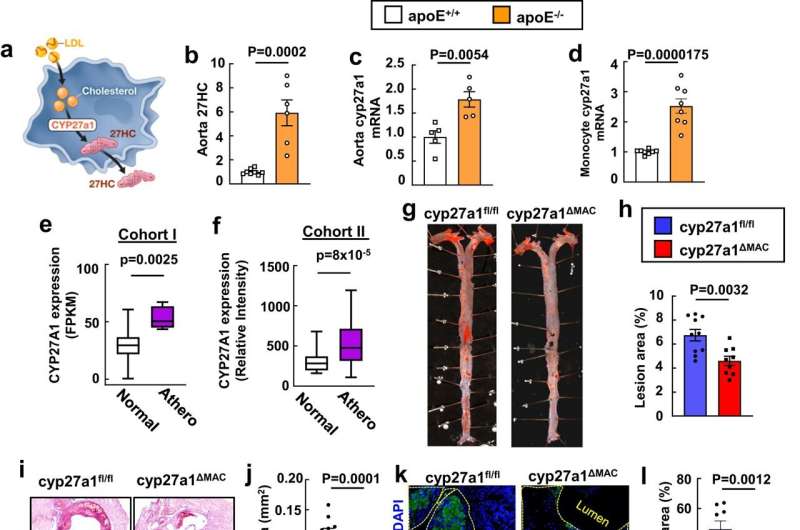This article has been reviewed according to Science X's editorial process and policies. Editors have highlighted the following attributes while ensuring the content's credibility:
fact-checked
peer-reviewed publication
trusted source
proofread
Research pinpoints inflammation source behind atherosclerosis

Scientists at UT Southwestern Medical Center and Children's Medical Center Dallas have discovered in mice how high cholesterol causes blood vessels to become inflamed, a necessary prerequisite for atherosclerosis—the "hardening of the arteries" responsible for most heart attacks and strokes. The findings, published in Nature Communications, could lead to new interventions to protect against cardiovascular diseases (CVD), the leading cause of death globally.
"Lowering circulating lipids, such as cholesterol, has not eradicated cardiovascular diseases by any stretch of the imagination. Our findings show a new possible way to attack a major arm of the processes that cause these conditions," said study leader Philip Shaul, M.D., Professor of Pediatrics and Director of the Center for Pulmonary and Vascular Biology in the Department of Pediatrics at UT Southwestern.
According to the American Heart Association, more than 19 million people died of heart attacks, strokes, and other manifestations of CVD worldwide in 2020, the last year for which this data is available. Because elevated cholesterol is a risk factor for the atherosclerosis that precedes these events, statins—drugs that lower cholesterol and were developed based on the Nobel Prize-winning work of UTSW researchers Michael Brown, M.D. and Joseph Goldstein, M.D.—have made considerable headway in reducing their rates.
It is known that inflammation partners with high cholesterol to drive atherosclerosis, but it is largely unknown how the inflammation begins. To better understand how blood vessels become inflamed in atherosclerosis, Dr. Shaul and his colleagues focused on immune cells called macrophages and how they act on the blood vessel wall. These metabolize cholesterol using an enzyme known as cyp27a1 to generate a product called 27HC.
Previous research elsewhere had speculated that the production of 27HC might protect against atherosclerosis, helping remove cholesterol that collects in blood vessels. But when the UTSW researchers used a genetic technique to inactivate cyp27a1 in a mouse model of atherosclerosis, preventing the animals' macrophages from producing 27HC, their disease improved instead of getting worse. Besides a 55% reduction of atherosclerotic plaques, these animals also had fewer immune cells interacting with the cells lining their blood vessels (called endothelial cells) and lower activation of the genes in endothelial cells that drive inflammation.
Then, hypothesizing that 27HC might be the root cause for the inflammation that promotes atherosclerosis, the researchers dosed mouse models with extra 27HC and found that their disease became worse. However, turning off ERα, a receptor for 27HC, in the endothelial cells prevented their atherosclerosis from accelerating.
Additional experiments in mice in which the genes for the cyp27a1 enzyme and ERα were turned on or off in different combinations showed that communication between the macrophages and endothelial cells by 27HC was necessary for atherosclerosis to progress. The team also found that a treatment inhibiting the cyp27a1 enzyme from producing 27HC provided protection from atherosclerosis.
If researchers can interrupt this cross-talk between the inflammatory cells and the blood vessel lining cells in humans, Dr. Shaul said, it could prevent atherosclerosis and its harmful consequences—especially in combination with statins.
"Our lab in Pediatrics aims to discover new means to prevent potentially devastating common disorders such as atherosclerosis and Type 2 diabetes by determining the underpinnings of these disorders at their origin," said Dr. Shaul, who holds the Associates First Capital Corporation Distinguished Chair in Pediatrics.
More information: Liming Yu et al, Macrophage-to-endothelial cell crosstalk by the cholesterol metabolite 27HC promotes atherosclerosis in male mice, Nature Communications (2023). DOI: 10.1038/s41467-023-39586-z





















